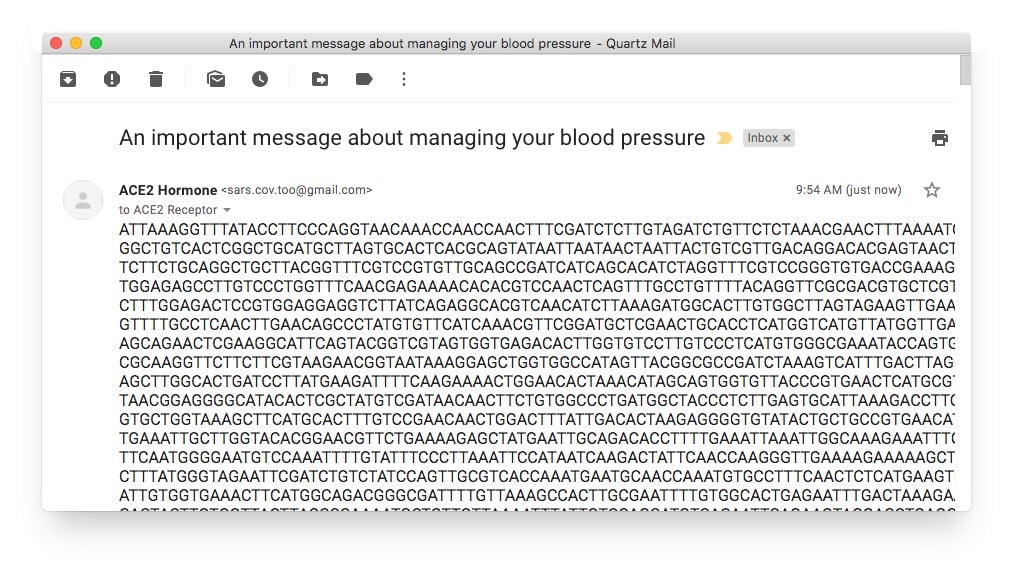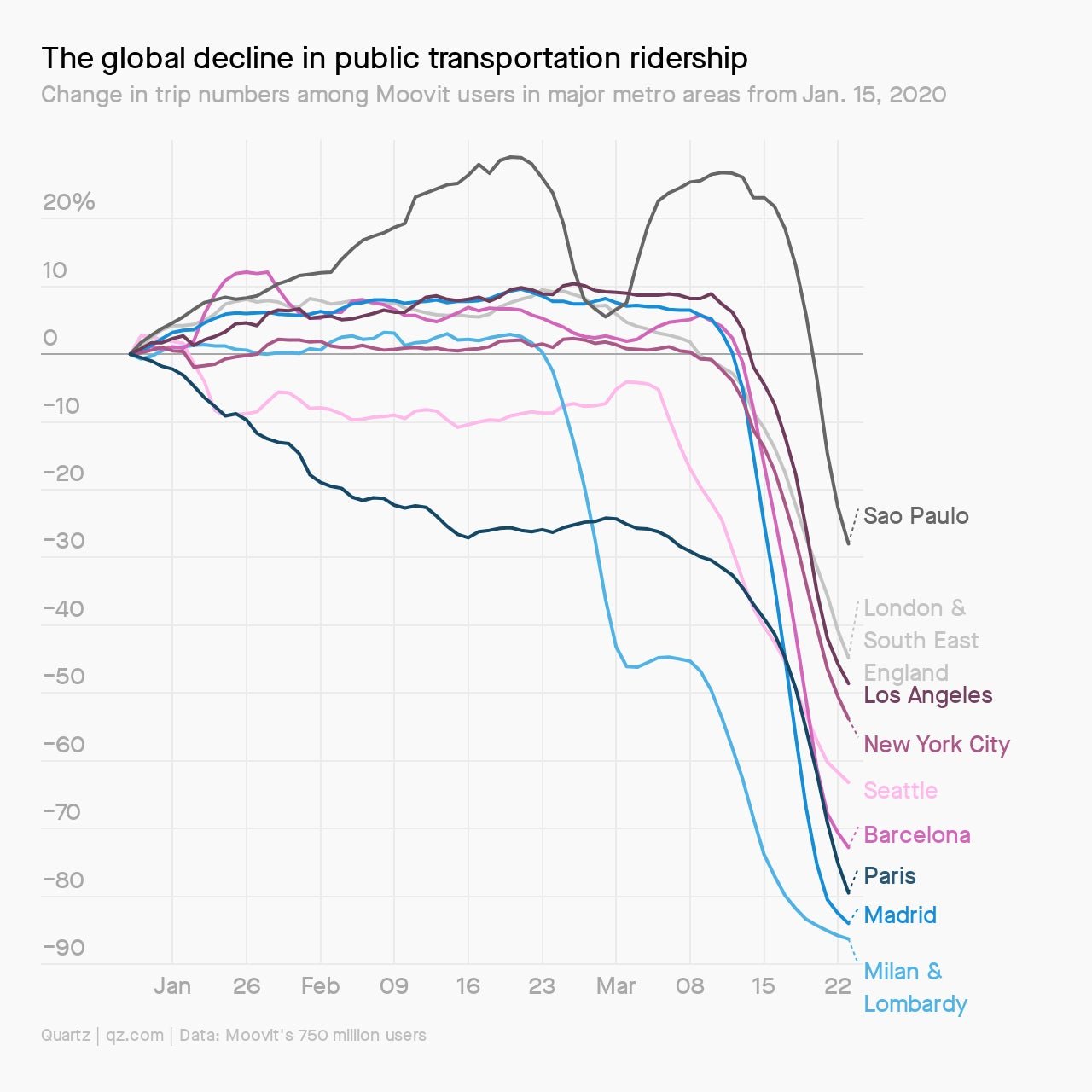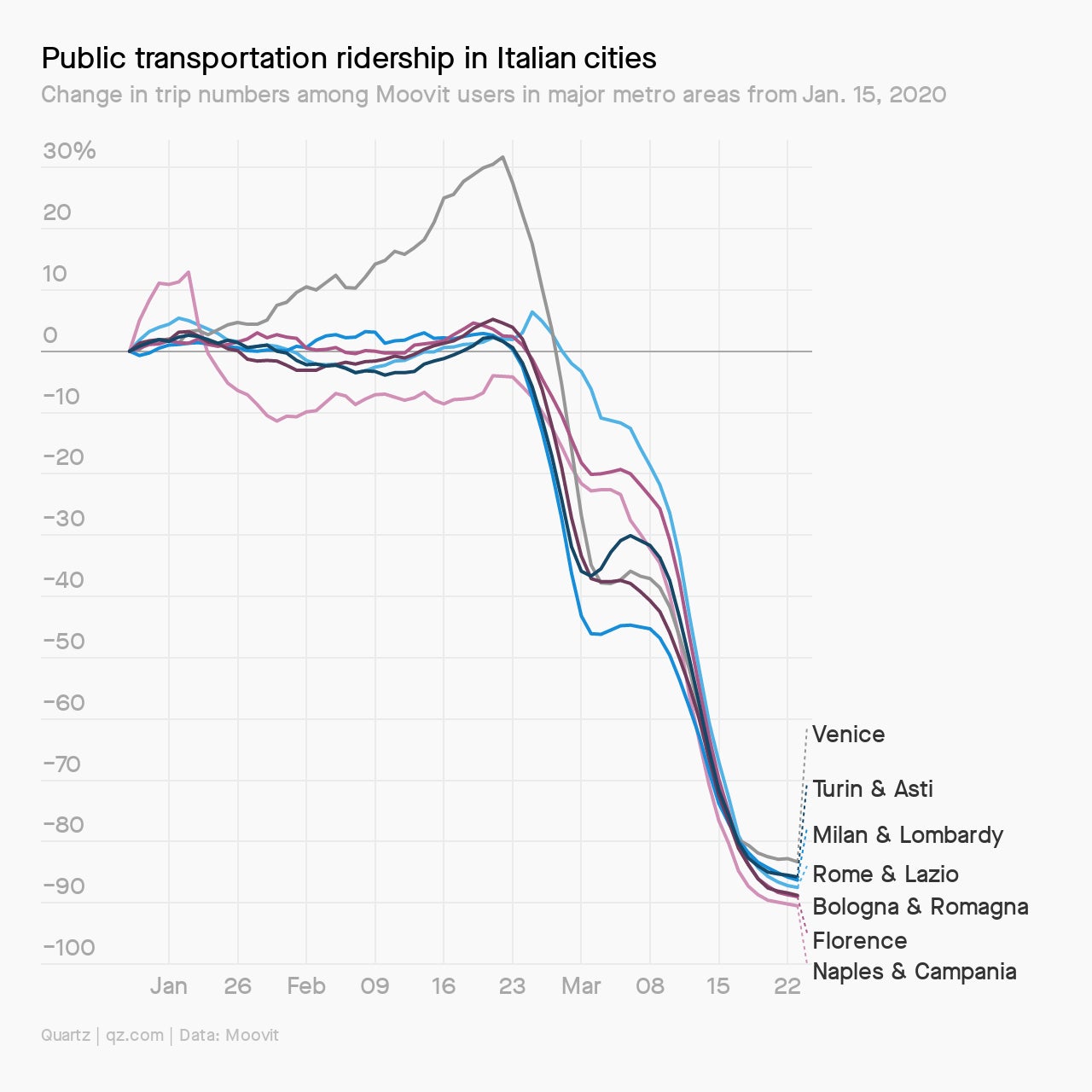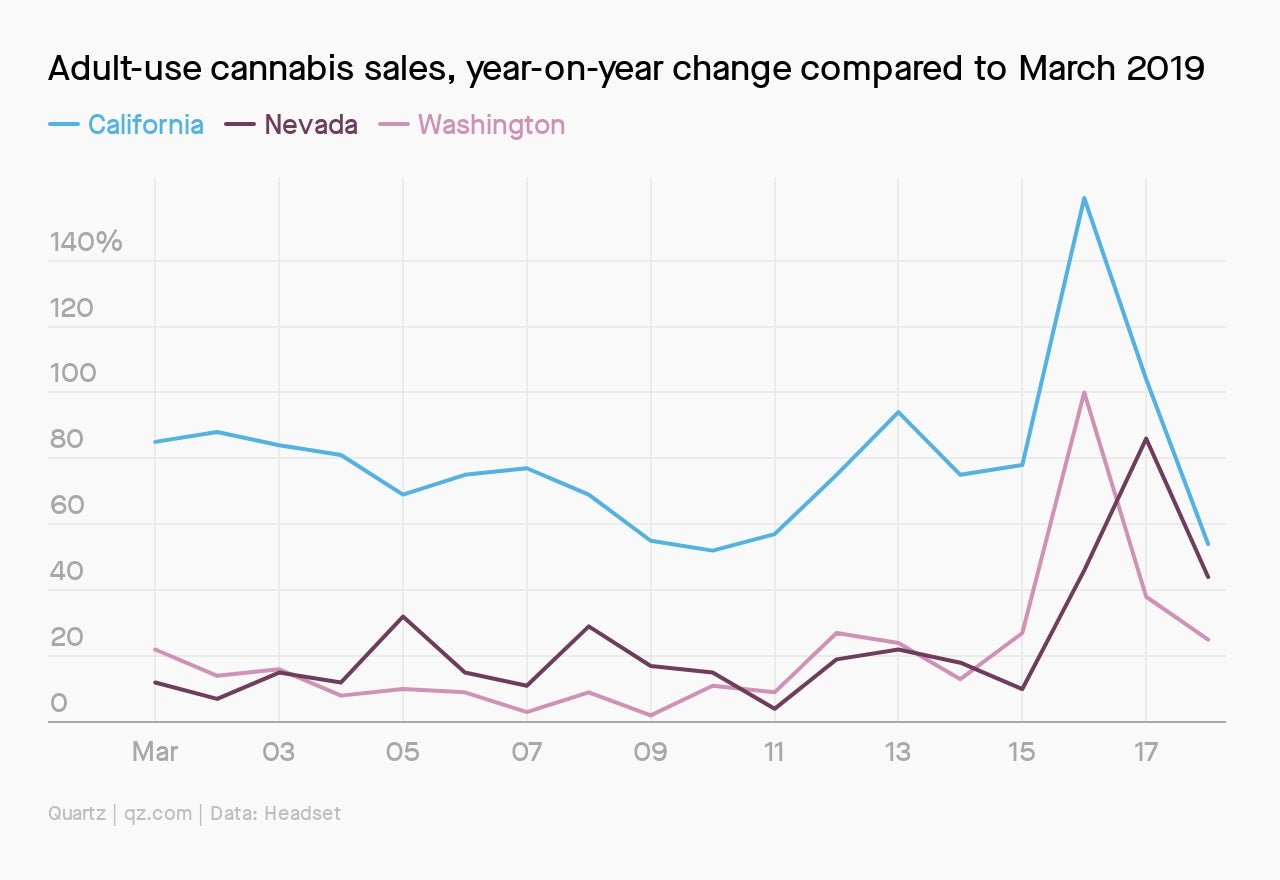Coronavirus: You’re in good company
Hello Quartz readers,

Hello Quartz readers,
Forging social connection has never been more challenging, or more important. So today we begin by thanking everyone who has reached out via email with thoughts, questions, and bits of zen wisdom. (Plus of course everyone who voted in our penne poll. Let’s just say a newsroom debate was settled.)
Here’s a snapshot of what’s on your mind:
- Suzanne P. suggests parents with kids at home try exploring national parks (virtually), making cookies, and improving everyone’s math skills with card games. “Teachers are a good source for ideas here,” she notes. “Many teachers are at home with lesson plans but no students.” (If you’re navigating multi-tasking and warding off chaos in a full house, join our Lives of Working Parents Now workshop on Thursday at 1pm EDT.)
- John P. is lamenting the state of grocery shopping, where panic-buying has brought out the worst in people. “Human nature is strange,” he writes. “In the bushfires they pulled together to help one another. Now personal greed has taken over.”
- Jessica B. is dealing with the lack of morning commute by hula hooping for an hour every day. (Respect.)
- Jesse S., a recent Fulbright alum in public health (congrats!) offered sage wisdom about that 18-month timeline floating around. “What’s the take? Society will adapt,” he writes. “We’re already figuring it out, but we need time to do so. For now, that means heavy containment measures; later, that means learning to live our lives cautiously, but fully, and definitely not entirely inside.”
- Carolyn M. sent over an inspiring “Resilience Strategy,” which includes streaming PBS nature walks, calling friends regularly, watching less TV (!), focusing on her health, and making donations to local food banks. “It is a moment-to-moment choice whether I do these things, and I always feel better when I do,” she writes. “I look for the good stuff and expand on it.”
We’ve also heard from some of you who are alone, self-isolating, and desperate for connection. These are the hardest emails to read, and the most important. We’re reaching out to each of you, and working on tools to help our readers find more ways to connect with us, and each other. In the meantime, we’d love to keep hearing from all you.
✉️ What are you cooking? (We’re running out of ideas.)
We’ll share responses in an upcoming email.
Okay, let’s get started.
All hands on deck
Not since World War II have so many companies in the business of making cars, clothes, or other items been asked to switch up their production lines for the common good.
As Covid-19 spreads around the globe, companies are retooling to make urgently needed medical supplies. China’s Foxconn, which assembles iPhones for Apple, and automakers in the country have been making face masks. In France, luxury group LVMH is making hand sanitizer. Spanish fast-fashion chain Zara has offered to produce hospital scrubs. UK prime minister Boris Johnson has asked companies such as Rolls-Royce to assist in making ventilators, while US president Donald Trump said he will invoke the country’s Defense Production Act to compel American industry to begin making medical supplies.
But changing entire production lines to make unfamiliar items is no simple task.
“What you first have to have is a really granular understanding of what kind of assets are required for this new product: what kind of equipment and what kind of competencies [among workers],” says Thierry Heinzmann, an expert on advanced manufacturing and production at the World Economic Forum (WEF). “If the gap is too far, you will not be able to bridge it.”
When companies do make these changes, they tend to focus on products close to their current abilities. During World War II, silk manufacturers made parachutes, while automakers produced plane engines, guns, and tanks. Medical products can bring their own challenges.
It’s still not clear, for example, whether Rolls-Royce will be able to produce ventilators easily. The design should be far simpler than the jet engines it builds, but manufacturing a ventilator requires specialized parts and expertise, while medical equipment requires certification and must often be made according to strict standards.
Companies ideally need to procure raw materials from their existing suppliers too, otherwise they face a lengthy search and qualification process. Shanghai General Motors, one of the Chinese automakers producing face masks, had a supplier of fabric for car interiors that also made medical-grade textiles, Heinzmann explains. And the company had a clean room for research and development that allowed it to meet the standards for manufacturing medical masks.
Most companies repurposing their factories so far have produced simpler items. Hand sanitizer isn’t much of a challenge for LVMH, which already has the formulation and bottling capabilities it needs at the French factories where it makes fragrances and cosmetics for brands such as Dior. Companies using 3D printing to make respirator valves in Italy only needed the designs.
The good news is trends in manufacturing, such as advanced robotics, data analytics, and 3D printing, have made it easier for companies to switch gears to make even complex products. “What companies are looking for is to be more flexible, have flexible factories that can adapt to make different types of products, who want to be faster to market, who need to customize products based on new consumer demands,” says Francisco Betti, Heinzmann’s colleague and fellow manufacturing expert at WEF. “It puts you in a good position to repurpose an entire production line.”
The virus is inside the house
For most people, Covid-19 seems to be pretty mild. That’s what makes it dangerous: Even those who don’t appear to be sick can spread the virus. So what is it about this particular virus—SARS-CoV-2—that makes it act this way?
It comes down to the virus’s basic biology. SARS-CoV-2 makes its way into human cells by pulling off a molecular phishing scam. A receptor called ACE2, when activated by a hormone, helps to mediate your stress response by constricting blood vessels. Coincidentally, SARS-CoV-2 looks a lot like that specific hormone. The ACE2 receptor accidentally lets it into the cell, where the virus can start replicating with abandon. Picture it like this:

Other coronaviruses have multiple routes of entry into cells, but SARS-CoV-2 appears to only have this one, which helps account for its slow-acting nature. And it may explain why some people, like those who take a class of drugs called ACE inhibitors for high blood pressure, are at higher risk.
Trainspotting
Public transportation has ground to a halt. Ridership has plunged more than 80% on major public transit systems in European and US cities since Jan. 15, according to data from Moovit, an urban mobility app with 750 million users. It’s a stark indication of how the coronavirus pandemic has brought urban life to a standstill.
Moovit data includes bus, train, subway, light rail, ride-hail, and shared mobility options like bikes and scooters. It doesn’t include all cities and countries around the world, including many in Asia.

In Italy, the country with the most deaths and second-most confirmed cases of Covid-19, public transport ridership is down between 80% and 90% in every major city for which Moovit provided data. Italy has imposed some of the strictest lockdown measures in the world in an effort to limit the spread of the virus.

Who’s a good boy?
There’s no better cure for stuck-at-home boredom than an adorable pet. But are animals a risk right now? Are they at risk? Andre DV wrote in asking if keeping pets at home is safe; the answer is: Yes—and good question.
According to the World Organization for Animal Health, two dogs have tested positive for SARS-CoV-2 through close contact with infected humans. But there is no evidence to suggest that animals infected by humans can spread the disease, and no evidence that Covid-19 can cause an animal to fall ill.
However, the organization notes, “because animals and people can sometimes share diseases (known as zoonotic diseases), it is still recommended that people who are sick with Covid-19 limit contact with companion and other animals until more information is known about the virus. When handling and caring for animals, basic hygiene measures should always be implemented. This includes hand washing before and after being around or handling animals, their food, or supplies, as well as avoiding kissing, licking, or sharing food.”

Do you have your own burning coronavirus question? ✉️ Send it our way.
Taking the high road
In just a few years, marijuana in the US has gone from illegal to “essential.”
As states around the country ask residents to stay home, cannabis sales are spiking, and dispensaries are making the cut—alongside gas stations, pharmacies, grocery stores, and hardware stores—as “essential services.” California, Nevada, and Colorado have all allowed dispensaries to remain open so long as they observe social distancing advisories, and Illinois dispensaries are offering curbside delivery to medical patients. The New York Department of Health has also deemed medical cannabis dispensaries essential.

“I really think it [sends] a strong message to the state that people need cannabis,” says Amanda Jones, co-founder of Kikoko, a Bay Area-based manufacturer of cannabis-enhanced teas, honey, and mints. “It’s not just a recreational activity. It is something that helps keep people calm. It helps with their anxiety; it helps with sleep; it helps with pain—all of which people need at a time like this.”’
Essential reading
- The latest 🌏 figures: 414,277 confirmed cases; 107,806 classified as “recovered.”
- In it together: More than 2.6 billion people are currently under lockdown orders.
- No Slacking: A popular video conference tool takes workers photos every five minutes.
- Social safety net: One in three new GoFundMe campaigns are coronavirus-related.
- Can you hear me now? Verizon is giving customers 15GB of extra data this month.
- Failure to launch: SpaceX just suffered its first coronavirus-related delay.
- Because I said so: Sales of a children’s book on hand washing are up 2,000%.
Our best wishes for a healthy day. Get in touch with us at [email protected], and live your best Quartz life by downloading our app and becoming a member. Today’s newsletter was brought to you by Marc Bain, Katherine Foley, Katie Palmer, Daniel Wolfe, Ali Griswold, Youyou Zhou, Jenni Avins, Max Lockie and Kira Bindrim.